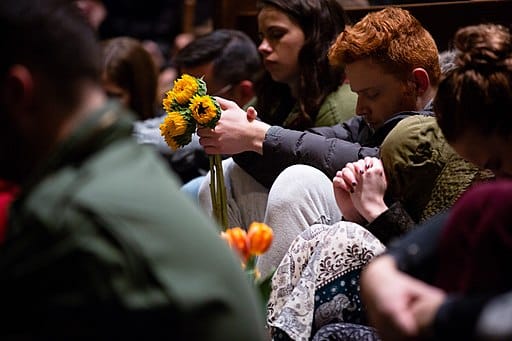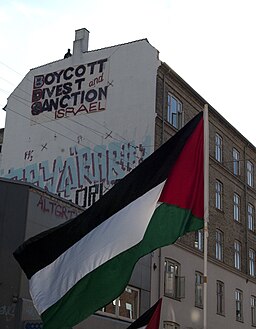The “New” Antisemitism

Antisemitism, often labeled “the world’s oldest hatred,” has caused immense suffering for centuries. Throughout history, it has manifested in horrific persecutions, including the Crusades, the Inquisition, and the Holocaust.
In recent times, this hatred has resurged. The increasing frequency and intensity of antisemitic acts recurring on college campuses and tragic incidents across the United States and around the world are evidence of this reawakening. Violence targeting Jewish people has broken out in the United States, historically a haven for Jewish people fleeing persecution in Europe. Synagogue shootings in Pittsburgh, Pennsylvania, and Poway, California, caused many Jewish institutions to tighten security measures. Other attacks followed, especially shootings and stabbings in and around New York City—home to the largest American Jewish community.

These incidents called into question the very safety of Jewish people on the streets and at home. The rise in antisemitism in the twenty-first century was already troubling. But the trends since October 7, 2023 are even more alarming. Following the Hamas terrorist attacks and subsequent war, antisemitism has spiked to a level unseen since the Holocaust. Many Jewish people around the world feel unsafe. Some avoid wearing Jewish symbols for fear of being targeted if recognized as Jewish.
Old Lies—New Cloaking
Much of the antisemitic fervor infecting the world in recent years is, in some ways, a new version of the “oldest hatred.” Like other forms, it keeps the fundamental antisemitic lie Jewish people are to blame for the world’s problems. This newer approach, though, cloaks hatred of Jewish people in the guise of anti-Zionism and anti-Israel sentiment. The pro-Palestinian movement claims to care about freedom and justice. Many of its supporters, however, are simply expressing antisemitic hate in a new way. As post-October 7 antisemitic incidents indicate, hatred of Israel often fuels hatred of Jewish people around the world.
To be clear, Israel is not a perfect country. Thoughtful criticism of Israeli policies is appropriate and even necessary. Freedom to critique the government is a benchmark of any democracy. Instead of this sort of reasoned debate, pro-Palestinian rallies are often breeding grounds for glorifying terrorism and calling for the destruction of Israel. While acknowledging not all anti-Zionism is antisemitism, it is essential to consider the ways one often gives fodder to the other.
When Criticism of Israel Crosses the Line

Antisemitism can intertwine with anti-Zionism, which the Anti-Defamation League characterizes as “a prejudice against the Jewish movement for self-determination and the right of the Jewish people to a homeland in the State of Israel.” 1 One example of this intertwining is the Boycott, Divestment, and Sanctions (BDS) movement, which calls on people to avoid buying from Israeli businesses. Another is Students for Justice in Palestine, who target and persecute Israeli speakers on university campuses.
Some Christians may not interpret the Bible as conveying ownership of the land of Israel to Jewish people. While this perspective is not the general sentiment of Chosen People Ministries, it does not necessarily lead to antisemitism.
However, a critical threshold is crossed when criticism of Israel transforms into hateful language and actions directed toward Israelis and the broader Jewish community. This form of anti-Zionism devolves into antisemitism.
Does It Pass the Test?
Imperfect human beings and a flawed government run the State of Israel. It is legitimate to engage in honest and healthy debate about policy. Natan Sharansky’s “3D test for antisemitism”—Demonization, De-legitimization, and Double standards—provides a valuable framework to discern when criticism is legitimate and when it veers into antisemitism. 2
Let us analyze it.
Demonization: Blunt Lies about Israel
Demonization occurs when classic antisemitic rhetoric and caricatures arise in discourse regarding Israel. For example, anti-Israel activist Ali Abunimah accused Israel of poisoning Palestinian water supplies. 3 These claims are false and perpetuate historical antisemitic lies. Abunimah’s claim is reminiscent of how many medieval Europeans accused their Jewish neighbors of poisoning wells and causing the Black Plague.
Delegitimization: Denying the Right to Exist
Delegitimization occurs when people undermine the State of Israel’s very right to exist. The Boycott, Divestment, and Sanctions movement is a good example. It seeks to undermine Israel’s ability to participate in the global economy. This movement relies on false narratives about Israel to isolate her from the world stage. 4
Double Standards: Unfair Resolutions for Israel
Double standards is the practice of placing requirements on Israel different from those set on other countries. This policy is evident in the disproportionate number of resolutions against Israel compared to other nations at the United Nations. Even places known for violating human rights—like North Korea and Iran—have received far less attention than Israel. 5 Double standards are also common among responses to the October 7 massacre. Among the heinous crimes Hamas committed was mass rape. Despite abundant eyewitness testimony and forensic evidence, institutions otherwise committed to supporting women’s rights have been largely silent on Hamas’ sexual assault on Israeli women. 6
Denouncing the “New” Antisemitism
The anti-Zionist or anti-Israel movement claims to care about peace and making life better for Palestinians. In practice, its activists often resort to antisemitic tactics, contributing to the growing antisemitic rhetoric and violence worldwide. Spreading lies about Israel is not the way to improve the lot of Palestinian people. It only fuels more hatred and violence. Much of the guilt for the suffering of Palestinians lies with their own leaders, who withhold aid money, indoctrinate children to be terrorists, and use noncombatants as human shields. Making life better for people in Gaza means a future without Hamas.

Ultimately, the only hope for peace, both personal and geopolitical, is the Prince of Peace—Yeshua (Jesus), the Jewish Messiah. We pray for all people in the Middle East to come to faith in Yeshua. As followers of Jesus, we need to be vigilant and call out antisemitism in all its forms. Even if we disagree about what the Bible says about Israel, we should stand united with the Jewish community against hatred. Antisemitism is more common and vicious than it has been in decades. We must take action to denounce it, even—and especially—when it manifests itself in the context of anti-Israel sentiment.
Notes
- “What Is . . . Anti-Israel, Anti-Semitic, Anti-Zionist?” Anti-Defamation League, August 17, 2017, https://www.adl.org/resources/tools-and-strategies/what-is-anti-israel-anti-semitic-anti-zionist. ↩︎
- Natan Sharansky, “Natan Sharansky: Why BDS Fails My 3D Test on Anti-Semitism | Opinion,” Newsweek, published September 25, 2019, https://www.newsweek.com/antisemitism-bds-natan-sharansky-3d-test-1461305. ↩︎
- “Book Review | Behind the Mask: The Antisemitic Nature of BDS Exposed,” Fathom Journal, October 2019, https://fathomjournal.org/book-review-behind-the-mask-the-antisemitic-nature-of-bds-exposed/. ↩︎
- “What Is BDS?” BDS Movement, accessed January 25, 2024, https://bdsmovement.net/what-is-bds. ↩︎
- Hillel Neuer, “List of 2019 UN General Assembly Resolutions on Countries,” X post, December 27, 2019, https://twitter.com/hillelneuer/status/1210505160750968833?s=21. ↩︎
- “United Nation’s Women’s Rights Group Criticized for Double Standards Regarding Gender-Based Violence,” All Israel News, November 29, 2023, https://allisrael.com/united-nation-s-women-s-rights-group-criticized-for-double-standard-regarding-gender-based-violence. ↩︎
- Header photo by Robert Thiemann on Unsplash. ↩︎
Sign up to recieve our email newsletters
Get the latest news from Israel, insights from Dr. Mitch Glaser, international ministry reports, as well as videos and podcasts, downloadable resources, discounts in our online store, and much more!